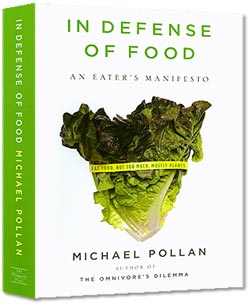University announces title of ‘Go Big Read’ book
This fall, the university will launch “Go Big Read,” a common reading program intended to engage students, faculty, staff, alumni and community members in a shared, academically focused reading experience.

From a short list compiled by a review committee from the nearly 400 nominated titles, Chancellor Biddy Martin has selected “In Defense of Food: An Eater’s Manifesto,” by Michael Pollan, as the book for the inaugural year.
“‘In Defense of Food’ had strong support from campus constituents,” Martin says. “It raises issues of importance to people from a wide range of disciplines; it will engage people on and off the campus, and it will promote lively discussion. These are the purposes of the book project.”
Published in 2008, “In Defense of Food” examines the modern American food landscape, where, Pollan says, the deceptively simple question of what to eat has been muddled by the numerous and often conflicting claims of food producers, marketers and nutrition experts.
“The book is relevant to all of us who each day make decisions about what to eat, and it will generate exciting, cross-disciplinary conversations about where our food comes from — and where it should come from,” says Sara Guyer, director of the Center for the Humanities.
Pollan will visit campus Sept. 24-26 for a series of major events for campus and the community. The Center for the Humanities in partnership with the UW–Madison Libraries; Morgridge Institute for Research; Nelson Institute Center for Culture, History and Environment; the Nelson Institute for Environmental Studies; College of Agricultural and Life Sciences; Wisconsin Initiative for Science Literacy; Bradshaw-Knight Foundation; REAP Food Group; and the Wisconsin Union Directorate Distinguished Lecture Series will sponsor Pollan’s visit as well as tie-in events related to the culture and politics of food, sustainable agriculture, public health and environmental journalism. More information about Pollan and his visit are available here.
“Michael Pollan has emerged as one of our nation’s wittiest and most intelligent commentators on food, agriculture, and our complex relationships with the natural world,” says Bill Cronon, director of the Center for Culture, History and Environment. “He takes serious ideas and helps make them accessible with clarity, storytelling, and fun. ‘In Defense of Food’ is a short, lively, engaging book that is easy to read but so full of ideas that you’ll keep returning to its arguments over and over again whether you’re preparing a meal, eating in a restaurant or shopping in the grocery store.”
“In Defense of Food” will be integrated into several courses across campus, and student groups are encouraged to use the book in club and service activities to bridge learning experiences inside and outside the classroom. Additional activities for faculty, students, staff, alumni, members of the local food and farming communities, K-12 students and the general public will continue throughout the year. Book discussion groups will convene on campus and in the community beginning in August, and readers will also be invited to participate virtually via a Go Big Read blog.
“I hope that these events, including Michael Pollan’s visit, will tap into the intellectual resources of the campus and spark vigorous discussions and exchange of diverse ideas across campus and in the community,” says Martin. “We are looking forward to an open and vibrant dialogue about how our food is produced in this country.”
The UW–Madison Libraries are working with the publisher to secure copies of the book for students at a substantial discount. Arrangements are also being made to assure that the book is available in campus and public libraries, as well as in local bookstores.
“I can think of few other books that sustain the interest of historians and philosophers, chemists and biologists, farmers and cultural critics. It is a book that both will challenge incoming students to think critically about their everyday lives and introduce them to the cross-disciplinary thinking demanded by complex issues,” says Guyer.
Visit the Go Big Read Web site to learn more about the program and to sign up for e-mail updates. The site will be updated throughout the year with news, event information, interactive content and volunteer opportunities.




